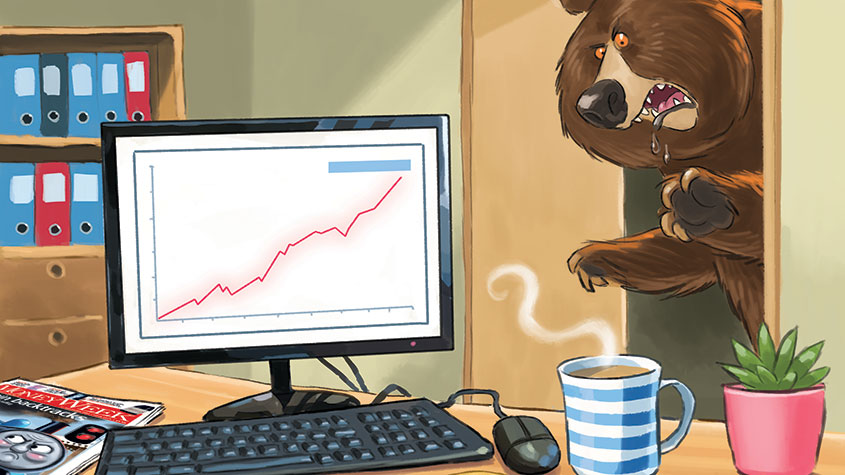China’s burgeoning bull market
Investors have plenty of reasons to be cautious at the moment, says John Stepek. But when it comes to Chinese stocks, the signs are more promising.

Get the latest financial news, insights and expert analysis from our award-winning MoneyWeek team, to help you understand what really matters when it comes to your finances.
You are now subscribed
Your newsletter sign-up was successful
Want to add more newsletters?

Twice daily
MoneyWeek
Get the latest financial news, insights and expert analysis from our award-winning MoneyWeek team, to help you understand what really matters when it comes to your finances.

Four times a week
Look After My Bills
Sign up to our free money-saving newsletter, filled with the latest news and expert advice to help you find the best tips and deals for managing your bills. Start saving today!
The global economy has been the setting for an epic tug-of-war in recent years, between the forces of inflation and deflation. Now with China devaluing the renminbi it looks as though deflation has won, says Tim Price. It's scary stuff, and I find it hard to disagree with Tim's take indeed, we've said for a long time that the most likely endgame for the post-financial crisis era would start with a deflationary scare.
However, "scare" is the important word here. Markets have a nasty habit of doing the one thing that you're least prepared for. So if we take a step back and look at what's going on, what do investors seem least prepared for right now?
It strikes me that, with bond yields at record lows (and so prices at record highs); commodities having crashed down to levels not seen since the 2008 financial crisis; and the US dollar leaving all other currencies flailing in its wake; markets are more prepared for deflation and tighter monetary policy than they are for inflation and looser monetary policy. Given that this is the exact opposite of what central bankers across the globe (including in China) want to see, do you really think we're going to get it?
MoneyWeek
Subscribe to MoneyWeek today and get your first six magazine issues absolutely FREE

Sign up to Money Morning
Don't miss the latest investment and personal finances news, market analysis, plus money-saving tips with our free twice-daily newsletter
Don't miss the latest investment and personal finances news, market analysis, plus money-saving tips with our free twice-daily newsletter
Markets are wobbling all over the place as they try to get to grips with what China's move means, and we're already seeing the likes of bond "guru" Jeffrey Gundlach probably the most respected bond investor in the world right now warning the Federal Reserve that it'll be opening Pandora's box if it hikes interest rates next month.
We need only see a few trading sessions where the Dow Jones closes down in triple-digit figures for the Fed to start reconsidering a rate rise, or to dilute market fears by hiking rates by an eighth of a percentage point rather than a quarter (seriously, wealth manager Pictet suggested this might happen in the FT this week, and I think it might be right).
Yet even as central banks have their fingers poised above the print buttons, there are signs that inflationary pressures are at least holding their own in some key areas. Walmart, the world's largest retailer, is starting to feel the pinch from rising wages. Britain's core inflation rate surprised on the upside too (as usual). What does it all mean?
When the gloom gets too great, you can expect the central banks to step in again. And unlike most developed-world central banks, China still has a significant level of slack to fall back on, as well as an economy that is still in a position to benefit from major reforms. "One day China will pull the lever and nothing will happen. We are not there yet," says Ambrose Evans-Pritchard (not generally known for his optimism) in The Daily Telegraph.
That's one reason why, I reckon, Rupert Foster, who wrote this week's cover story on China, is right and that China is more likely to be near the start of a long bull market than a massive bear market.
Get the latest financial news, insights and expert analysis from our award-winning MoneyWeek team, to help you understand what really matters when it comes to your finances.

-
 Should you buy an active ETF?
Should you buy an active ETF?ETFs are often mischaracterised as passive products, but they can be a convenient way to add active management to your portfolio
-
 Power up your pension before 5 April – easy ways to save before the tax year end
Power up your pension before 5 April – easy ways to save before the tax year endWith the end of the tax year looming, pension savers currently have a window to review and maximise what’s going into their retirement funds – we look at how
-
 What to do as the age of cheap money and overpriced equities ends
What to do as the age of cheap money and overpriced equities endsEditor's letter The age of cheap money, overpriced equities and negative interest rates is over. The great bond bull market is over. All this means you will be losing money, says Merryn Somerset Webb. What can you do to protect yourself?
-
 Investors are bullish – but be very careful
Investors are bullish – but be very carefulEditor's letter Many investors are buying the dip, convinced the latest upswing is the start of a new bull market. The odds are that it’s not, says Andrew Van Sickle. The bear has unfinished business.
-
The MoneyWeek approach to investing
Editor's letter At MoneyWeek, our aim is simple: to give you intelligent and enjoyable commentary on the most important financial stories, and tell you how to profit from them. So how do we do that?
-
 Celebrity bitcoin ads echo the subprime mortgage crisis
Celebrity bitcoin ads echo the subprime mortgage crisisEditor's letter A wave of ads featuring celebrities punting crypto to the masses are reminiscent of how low income Americans were encouraged to take on loans they couldn’t afford, says Merryn Somerset Webb.
-
 Will the UK's property slowdown turn into a house-price crash?
Will the UK's property slowdown turn into a house-price crash?Editor's letter As the cost-of-living crisis intensifies and interest rate rise, it is hard to see reasons for UK house prices to keep rising, says Merryn Somerset Webb.
-
 The unintended consequences of ESG investing
The unintended consequences of ESG investingEditor's letter Many people are refusing to invest in energy companies, citing "ESG" concerns. But we still need fossil fuels, says Merryn Somerset Webb, and will for years to come. Boycotting the sector is a bad idea.
-
 What sardines can teach investors about today's markets
What sardines can teach investors about today's marketsEditor's letter A California tale of “eating sardines” and “trading sardines” can help us divide investments into speculative and real, says Merryn Somerset Webb. Something that's very useful when looking at today’s markets.
-
 The market finally seems to be getting it
The market finally seems to be getting itEditor's letter Reality checks are coming fast to the markets, says Merryn Somerset Webb – with even 2022’s safe havens beginning to reflect recession worries.